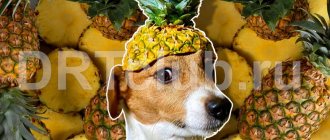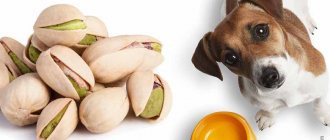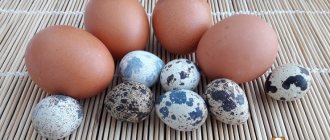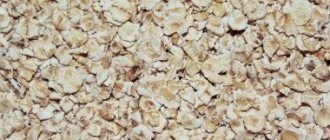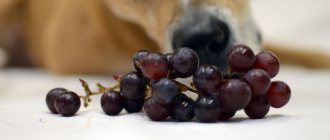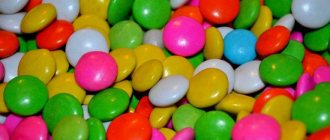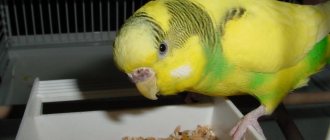Modern owners are concerned about the question: what fruits can dogs eat? Before industrial food entered the market, dogs and cats received natural food in the form of meat, poultry and fish supplemented with cereals, vegetables, fruits, berries, herbs and wild herbs. They grew well, took places at exhibitions, worked and gave birth to offspring.
With the massive transfer of dogs to industrial food, owners begin to wonder whether introducing additional products into the pet’s diet will harm them. Veterinarians say that mixing ready-made food and natural products is not permissible. In principle, this is correct, since the animal’s digestive system is adjusted to assimilate one type of food, which means that the second type remains undigested and can cause disorders. At the same time, one cannot assume that dry and wet industrial food completely satisfies the dog’s needs for vitamins, microelements, and fiber.
Should you give your dog fruit?
Fruits and berries should be in the diet of every dog.
Some owners believe that the dog has enough vitamins from meat, dairy products and cereals, which he eats daily, and if he eats industrial food, then it contains the necessary vitamins and minerals. Others believe that the animal needs an additional source of vitamins, which are found in fruits and berries. But you need to know what fruits to feed your dog.
The dog's diet should include at least 5% of plant products.
Fruits are a source of coarse dietary fiber, which improves digestion in dogs. Plant fiber is poorly digested by the body, but it is necessary for the full development of the animal. You can give fruit to your dog from puppyhood or at an older age, when a lack of microelements begins to be felt and cholesterol levels rise. Important! Fruits can be offered solely as a supplement, and not as a substitute for one full feeding.
You should not feed your four-legged pet fruit every day. His body does not produce an enzyme to break down plant fiber, so more harm than good can be done to the animal.
Adult pets can be given the product in pieces. It is not necessary to grind it to a puree. As for canned products, they are strictly prohibited for animals.
You should choose only fresh fruits for feeding
Content
1. What benefits will the fruit provide to the body? 2. Negative consequences 3. Features of feeding 4. If a dog accidentally swallows a bone, what to do? 5. Which dogs are in the “risk zone”? 6. What can you include in your diet instead of plums 7. Let’s summarize
The owner’s task is to monitor the health of the pet. Compliance with the rules developed by nutritionists and veterinarians is a guarantee of normal development and full functioning of the dog’s body. This is the only way to achieve stable immunity and provide the dog with vigor and activity, starting from a very early age!
An important source of health and successful development of a dog is:
- preparing a diet;
- selection of balanced and high-quality food.
The basis of the diet is meat and porridge. Vegetables and fruits make up a minimum percentage. But every caring dog owner tries to give his pet something tasty. One of these “delicacies” is plum. How beneficial is this product for the animal’s body? Perhaps there is no benefit, but only harm? Let's find out!
Recommended fruits, dried fruits, berries
Fruits do not help improve a dog’s immunity; for this it is necessary to use complex nutritional supplements. They are used exclusively as a reward for training or as a way to please your four-legged pet, but you need to know which of them can be given:
- Apples. The product is absolutely safe for animals and has a positive effect on the gastrointestinal tract. It can be given in natural, baked or dried form. For a large pet, half an apple is enough; for a small pet, for example, a Chihuahua or a Spitz, 2 or 3 pieces. Before offering your dog such a treat, it is necessary to remove the bones, which contain a toxic substance.
- Pineapples. The product contains a high percentage of bromelain. It can be offered to your four-legged friend as a dessert.
- Bananas. A quarter of the product can be offered to your pet once a day. For convenience, you can crush it with a fork.
- Melons. You can offer it to your animal often, but in small quantities. You can benefit from the product by adding a spoonful of honey to it, but only if your pet is not allergic to bee products.
- Watermelon. You can give it to your dog in unlimited quantities, but he will need to be walked frequently. Watermelon rinds can also be given.
- Plums. You can offer plums only if they are not very ripe; they should first be pitted.
- Pears. Animals that are accustomed to such foods eat pears well.
- Rowan. This berry contains a high amount of microelements that are well absorbed. It is necessary to accustom your pet to it from puppyhood. For example, adding it to porridge.
- Gooseberry. You can only offer natural berries that have ripened without chemical acceleration.
- Blueberry. We can talk endlessly about the benefits of blueberries for humans. It is also useful for dogs, but they rarely eat it in its pure form, so it is better to add berries to the porridge.
- Currant. Pets often eat it in its pure form. It is better to grind red currants with other sweet fruits or honey.
- Dried apricots. Dried fruit is good for dogs because it contains vitamins and amino acids. But experts do not recommend offering dried prunes and raisins, because they are difficult to digest.
Important! A dog needs 4-8 berries a day, if they are currants, rowan berries, blueberries or gooseberries. If it is strawberries, then no more than 1 berry per day is enough.
Strawberries should be given to your pet in moderation
Allowed fruits and their benefits
- Green apples are the safest and most accessible fruit. Excellent supplier of vitamin C and fiber. Improves digestion and is an ideal treat for older dogs due to its low fat and protein content.
- Pears practically do not cause allergies and help reduce the risk of stroke. You need to give preference to hard varieties.
- Bananas are a source of potassium. But you need to avoid overripe fruits, which can cause digestive upset. And due to the abundance of sugar, it is not advisable to give it to dogs too often.
- Dogs can eat plenty of watermelons grown without the use of nitrates and various accelerators. Due to their composition, they are an additional source of water for the body in the hot summer. A side effect is frequent urination.
- Pineapples are rich in an enzyme that helps digest proteins - bromelain. Great as a dessert.
Fruits that can be given in limited quantities
Fruits may not always benefit your dog's health. There are also those that can cause discomfort in the animal. For example:
- Papaya. A slice of papaya with the skin removed will stop diarrhea, but this fruit can be given occasionally. When used regularly, it causes constipation and increases blood sugar levels.
- Kiwi. One small circle of kiwi will saturate the body with vitamin C. For a medium-sized pet, it can be given no more than once every 2-3 weeks. But can a Yorkie eat kiwi? Yes, but only if you follow moderation when feeding.
- Persimmon. This product is useful, but is it possible to give persimmon to a dog? If you have problems with stool, you can offer your pet soft varieties of persimmon without peel.
- Cherries and sweet cherries. The product does not benefit the pet.
- Mango. Owners are also interested in the question: can dogs eat mangoes? In small quantities it is even useful, but overeating it can lead to stomach upset.
- Apricots. In large quantities, the fruit causes intestinal relaxation, especially in puppies and young dogs.
- Strawberry. During the season, you can offer your pet a couple of berries a day, but you should carefully monitor the body’s reaction, because strawberries are an obvious allergen.
- Raspberries. Raspberries are a stronger allergen than strawberries, so they can be given in limited quantities.
- Blueberry. Useful only in small quantities.
On a note! The dog can be given only seasonal fruits and berries, since imported products can be harmful to health.
After introducing any fruit, it is necessary to monitor the condition of the animal.
What benefits will the fruit provide to the body?
Many owners are wary of the negative effects of the pulp on the body and limit their pets’ consumption of this fruit. The threat is an allergic reaction or food poisoning, intestinal disorder. There is some truth in this, because this fruit, just like persimmon or peach, is a laxative for the intestines.
The pulp of the fruit contains a lot of vitamins and microelements that have a beneficial effect on the dog’s body. Not all varieties are equally tasty and healthy. Experienced “dog lovers” recommend choosing a certain variety of “Hungarian”. It has been proven that this particular variety has minimal impact on the intestines and almost never causes intestinal disorders.
What do experts say about the benefits of the product? Doctors and nutritionists, veterinarians with extensive experience in practice recommend including ripe, juicy pulp in the diet of a large individual, for example:
- Serbernard;
- mastiff (Tibetan).
It is necessary to monitor the dosage. Overeating is unacceptable! In this case, unpleasant symptoms can be avoided.
Forbidden fruits
There are fruits that are strictly contraindicated for dogs. This:
- Grape. Despite the pleasant taste, unlimited consumption of grapes by pets can lead to dire consequences. The fruits and their juice can cause kidney failure, coma and death. In small quantities, grapes can cause severe vomiting and diarrhea.
- Pomegranate. There is a lot of speculation surrounding this product: can dogs eat pomegranates? Its increased level of acidity has a negative effect on the animal's stomach. The seeds of the product, even in small quantities, are dangerous for dogs.
- Citrus. Some animals may have an individual intolerance to oranges and tangerines. In large quantities, these fruits cause vomiting.
- Avocado. Substances contained in avocados can cause diarrhea, vomiting, pancreatitis, breathing problems, and heart problems in dogs.
- Quince. This product is sour, and not every dog can eat it. In addition, it causes severe vomiting.
- Peaches. Peaches contain cyanide, which accumulates in the body over time. They also cause diarrhea, and if the dog also eats the bones, this can lead to intestinal problems and even poisoning.
Uncontrolled consumption of watermelon may cause an allergy in your pet.
Features of feeding
So, we have determined that plum does not cause a negative reaction in our pet. The next step is to decide on the dosage and know how much plum can be given in food and with what frequency. The recommendation here is this: treat the animal with ripe prepared fruit no more than 2 times a week (20-40 minutes before lunch).
It’s obvious that the fruit needs to be prepared for consumption:
- remove the pit (required);
- peel the peel (optional);
- Divide the fruit into small, approximately equal-sized slices.
Differences in feeding fruit to puppies and adult dogs
Fruits are considered as an additive to a dog's diet, so their content should not exceed 5%. There is no need to switch your pet to feeding exclusively fruits, as this can be harmful to health.
They can be offered fresh to adult dogs without fear of harming the health of the gastrointestinal tract. It is only necessary to observe the measure. You should not grind fruits with a blender, fearing that fiber is poorly absorbed by the stomach.
Puppies should be offered fruit grated on a coarse grater. It is best to pre-simmer them in boiling water or even bake them.
Puppies' stomachs are not ready to digest whole fruits
If your dog accidentally swallows a bone, what should you do?
The main thing is not to panic! Calmly monitor your pet’s behavior and prepare a mild product that envelops the esophagus and stomach. The best choice:
- lactobifadol;
- bifitrilak.
Such drugs will soften the load on the stomach and help prevent damage to the esophagus. An additional function is to help remove the bone from the fetus from the body.
Harm and allergies
Allergy to plums, as well as to fruits in general, is a fairly rare phenomenon in dogs. Typically, allergies are caused by certain types of proteins. However, if your pet develops allergy symptoms after eating plums, you should immediately take him to a veterinary clinic for an examination.
Allergies in dogs are determined by the following signs:
- itching and redness of the skin: your dog often scratches his ears and behind the ears, rubs against furniture, chews his skin;
- Some areas of the skin become inflamed and hair falls out;
- redness of the eyes, tearing: the animal often sneezes or coughs, cloudy liquid appears in the corners of the eyes;
- seals appear on the skin.
Modern examination methods make it possible to identify allergies in dogs with high accuracy. In the event of an allergy, symptomatic treatment and exclusion of plums from your pet’s diet are suggested.
Important! When buying plums for your dog, you need to choose fresh and natural fruits. If you feel that the plum has a tart wine smell, refrain from purchasing. Most likely, such a fruit has already fermented and its consumption will cause intestinal upset.
A sign of a good fruit is a light coating on the skin, a dry, hard stem and an even color of the fruit.
Allowed vegetables
Lists of healthy and unhealthy foods for animals are very controversial. If your dog likes the forbidden fruit and it does not cause health problems, then feel free to introduce it into the diet and do not deprive your pet of the pleasure of eating his favorite dish. What vegetables can you give your dog 100%?
Zucchini
If children start complementary feeding with it, then there is definitely nothing bad in it for dogs. Zucchini is a source of folic acid, calcium and potassium. Good for constipation in older dogs. Zucchini is useful both raw and after a little heat treatment, so that beta-carotene is better absorbed.
Carrot
Necessary at any age. Carrot chunks are a great snack, especially during puppyhood, as chewing a hard carrot will reduce teething itching. This root vegetable is rich in vitamins B, C, E, PP, as well as phosphorus, potassium, magnesium, iodine, iron, copper, zinc. Regular consumption of carrots improves vision, helps prevent the formation of tumors, and also improves the condition of the coat. For most dogs, carrots do not cause problems, but some develop allergies due to the high content of carotene in this root vegetable. Carrots are a forbidden food for diabetic animals.
Celery
Only the stems are useful and in small quantities. This vegetable is recommended to be added to the diet as a medicine, because celery has an anti-inflammatory effect and helps with arthritis in older dogs.
Pumpkin
Indispensable for animals with high stomach acidity. If you regularly add pumpkin to your food, you will forget what problems your pet has with stool. Some animals don't like the texture of pumpkin, so it's better to grate it instead of cutting it. In addition, it is not advisable to give pumpkin raw, because it is rich in vitamin A, which is better absorbed with fats and after heat treatment.
Cucumber
In high esteem among four-legged pets. Simple in taste, watery cucumber is rich in complex organic substances that normalize intestinal function. It contains potassium, magnesium, copper, biotin, as well as vitamins B1, C and K. It is especially useful for animals with large weights. However, no matter how much your dog loves cucumbers, it is necessary to limit him in this delicacy, because large amounts of this vegetable can cause diarrhea.
bell pepper
Give in moderation and prefer red pepper to green pepper, as it contains more beneficial microelements. The taste of this vegetable is quite difficult for a dog, but some people simply adore it. To instill a love for pepper in your four-legged friend, start adding it to food in small portions, grating it. Can be consumed both raw and baked.
Cabbage
Peking, Brussels and cauliflower are suitable, but you have to be careful with cabbage. It can cause an increase in the acidity of gastric juice, and also leads to flatulence and colic. But many four-legged animals tolerate cabbage well in any form, so you can try introducing it into the diet and see the reaction. If you are afraid of problems, offer your dog a slightly boiled cabbage leaf. Undeservedly, broccoli was included in the list of forbidden vegetables. It contains isocyanate, which is toxic to animals, but if the total weight of broccoli does not exceed 10% of all vegetables, then it can be added to the diet. Broccoli contains a large amount of useful vitamins and microelements.
Strawberry
Like most other berries, strawberries are full of antioxidants. To ensure safe feeding, cut the leaves off the top first and then quarter the strawberries. If your dog is small, cut each quarter in half (or smaller).
Benefits:
- Provide a significant boost to immune system health, help regulate blood sugar levels and act as a natural anti-inflammatory.
- Contains vitamins C, B-6, K and E, as well as folic acid, potassium and manganese.
Pregnant, lactating and puppies
Particular attention should be paid to pregnant lactating females, because their diet greatly affects the condition and health of the puppies.
Veterinarians do not recommend including plums in the menu of lactating females and puppies, like many fruits, since despite its beneficial properties, plums will cause a laxative effect, which will have a bad effect on the fragile digestive system of puppies.

